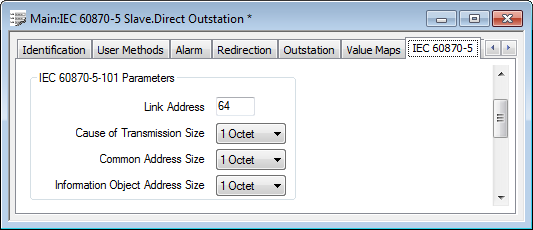The fields within the IEC 60870-5-101 Parameters section of the IEC 60870-5 tab apply to IEC 60870-5 Slave Direct Outstations that communicate with ClearSCADA using the IEC 60870-5-101 protocol. (To communicate with ClearSCADA using the IEC 60870-5-101 protocol, the channel through which the outstation communicates has to be configured to use the IEC 60870-5-101 Protocol Type (see Specify the IEC 60870-5 Communications Protocol).)
Use the fields within the IEC 60870-5-101 Parameters section of the IEC 60870-5 tab to configure the protocol properties that are specific to that slave outstation.

- Link Address—Use to define the Link address of the slave outstation. The valid range varies, depending on the channel’s Link Address Size (see Configure IEC 60870-5-101 Protocol Properties).
- If the Link Address Size is 1 Octet, the valid Link Address range is 0 to 254 inclusive.
- If the Link Address Size is 2 Octets, the valid Link Address range is 0 to 65534 inclusive.
- The Link Address is optional if the outstation is on a channel that uses a Balanced Transmission Procedure (see Configure IEC 60870-5-101 Protocol Properties). ClearSCADA ignores any configuration in the outstation’s Link Address field if the channel’s Link Address Size is set to 0 Octets.
- Cause of Transmission Size—Each Application Service Data Unit (ASDU) includes an indication as to the ‘cause’ of the transmission. An ASDU might be transmitted, for example, as a result of a Control request, or due to periodic scanning of the slave outstation. Use the Cause of Transmission Size combo box to specify whether the cause is transmitted as 1 Octet, or 2 Octets.
- (A slave outstation that communicates using the IEC 60870-5-104 protocol uses 2 octets to indicate the cause of a transmission.)
- Common Address Size—The Common Address is used to identify the outstation on which each item of point data is located (see Configure the Common Address). The Common Address is transmitted in each ASDU.
- Use the Common Address Size combo box to specify whether the Common Address is transmitted as 1 Octet, or 2 Octets. (The valid range for the Common Address varies, depending on the Common Address Size—see Configure the Common Address.)
- Information Object Address Size—Each input and output on a slave outstation has an Information Object Address (IOA). The address is associated with the Filtered Value Map that is used to map the ‘point’ data. It used to uniquely identify each item on the slave outstation and is transmitted in each ASDU that includes information about that particular input or output.
- Use the Information Object Address Size combo box to specify whether this address is transmitted as 1 Octet, 2 Octets, or 3 Octets. (The valid range within which the First IOA on each Filtered Value Map has to occur varies, depending on the number of octets specified in this field—see Specify the Filtered Value Maps that Store the Source Data.)
- (An outstation that communicates using the IEC 60870-5-104 protocol has an Information Object Address Size of 3 octets.)